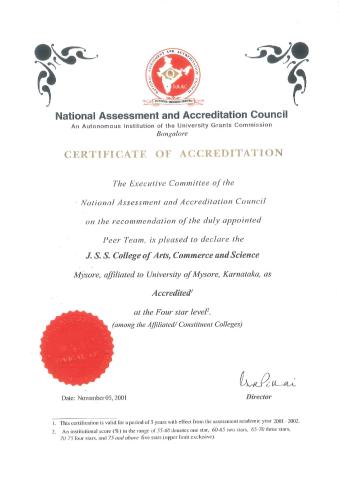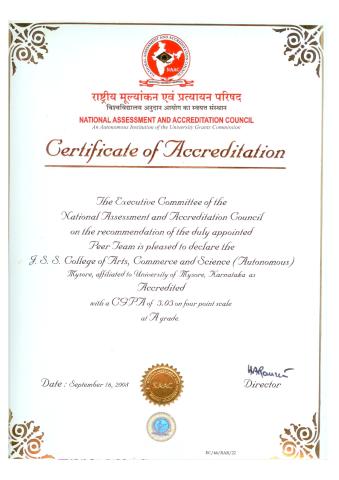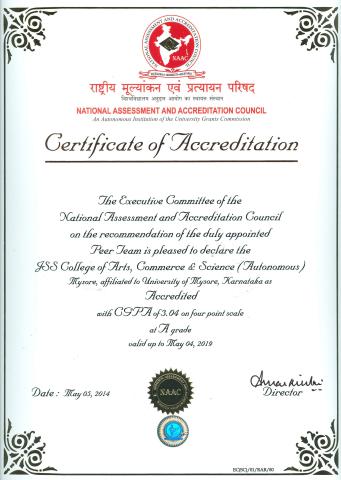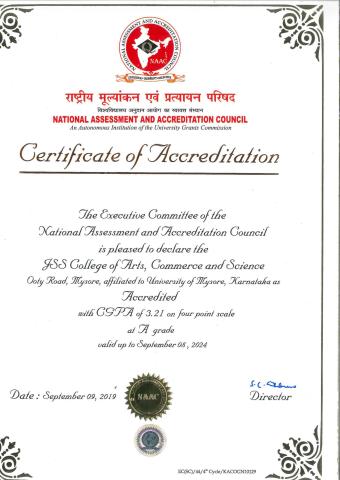About NAAC
With the concern on the quality and relevance of the higher education and as per therecommendations of the National Policy on Education (NPE, 1986) and the Programme of Action (PoA, 1992), the National Assessment and Accreditation Council (NAAC) was established in 1994 as an autonomous institution of the University Grants Commission (UGC) with its Head Quarter in Bengaluru. The NAAC is striving in different dimensions on assuring quality in education sector as an integral part of Higher Education Institutions (HEIs).
The NAAC functions through its General Council (GC) and Executive Committee (EC) comprising educational administrators, policy makers and senior academicians from a cross-section of Indian higher education system. The Chairperson of the UGC is the President of the GC of the NAAC, the Chairperson of the EC is an eminent academician nominated by the President of GC (NAAC). The Director is the academic and administrative head of NAAC and is the member-secretary of both the GC and the EC. In addition to the statutory bodies that steer its policies and core staff to support its activities NAAC is advised by the advisory and consultative committees constituted from time to time.
The vision of NAAC
To make quality the defining element of higher education in India through a combination of self and external quality evaluation, promotion and sustenance initiatives.
The mission of NAAC
- To arrange for periodic assessment and accreditation of institutions of higher education or units thereof, or specific academic programmes or projects;
- To stimulate the academic environment for promotion of quality in teaching-learning and research in higher education institutions;
- To encourage self-evaluation, accountability, autonomy and innovations in higher education;
- To undertake quality-related research studies, consultancy and training programmes, and
- To collaborate with other stakeholders of higher education for quality evaluation, promotion and sustenance.
The NAAC works with five core values:
- Contributing to National Development
- Fostering Global Competencies among Students
- Inculcating a Value System among Students
- Promoting the Use of Technology
- Quest for Excellence
NAAC assesses HEIs on seven Criterion with 34 key indicators basis which comprised of 72 quantitative and 35 qualitative metrics. The criterions and weightage for each are given below:
- Curricular Aspects
- Teaching-Learning and Evaluation
- Research, Innovations and Extension
- Infrastructure and Learning Resources
- Student Support and Progression
- Governance, Leadership and Management
- Institutional Values and Best Practices
The weightage for assessment of Autonomous colleges:
|
Criterion |
Weightage of Scores |
|
1.Curricular Aspects |
150 |
|
2.Teaching- Learning and Evaluation |
300 |
|
3. Research, Innovations and Extension |
150 |
|
4.Infrastructure and Learning Resources |
100 |
|
5. Student Support and Progression |
100 |
|
6.Governance, Leadership and Management |
100 |
|
7.Institutional Values and Best Practices |
100 |
| Total | 1000 |
Institutional Grades and Accreditation Status
|
Range of Institutional Cumulative Grade Point Average (CGPA) |
Letter Grade |
Status |
|
3.51-4.00 |
A++ |
Accredited |
|
3.26-3.50 |
A+ |
Accredited |
|
3.01-3.25 |
A |
Accredited |
|
2.76-3.00 |
B++ |
Accredited |
|
2.51-2.75 |
B+ |
Accredited |
|
2.01-2.50 |
B |
Accredited |
|
1.51-2.00 |
C |
Accredited |
|
≤ 1.50 |
D |
Not Accredited |
Accreditation Certificates
NAAC SELF STUDY REPORT FOR 4th CYCLE OF ACCREDITATION
- Annual Quality Assurance Report 2022-2023
- Annual Quality Assurance Reports 2021- 2022
- Annual Quality Assurance Reports 2020 - 2021
- Annual Quality Assurance Reports 2019 - 2020
- Annual Quality Assurance Reports 2018 - 2019
- Annual Quality Assurance Reports 2017-2018
- Annual Quality Assurance Reports 2016-2017
- Annual Quality Assurance Reports 2015-2016
- Annual Quality Assurance Reports 2014-2015
- Annual Quality Assurance Reports 2013-2014
- Annual Quality Assurance Reports 2012-2013
- Annual Quality Assurance Reports 2011-2012
- Annual Quality Assurance Reports 2010-2011
- Annual Quality Assurance Reports 2009-2010
- Annual Quality Assurance Reports 2008-2009




